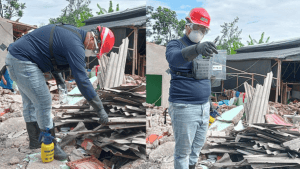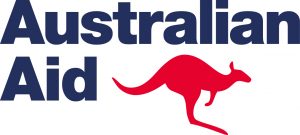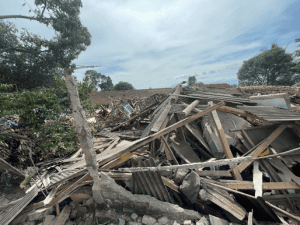The magnitude 5.6 earthquake in Cianjur, Indonesia in late 2022 claimed the lives of 334 people and a further 593 people suffered serious injuries. The earthquake damaged 53,408 houses and more than 800 public facilities such as schools and health facilities.
Asbestos roof sheet is still widely used in residential and commercial buildings. This created a very high risk of exposure to airborne asbestos fibres for Safety and Rescue (SAR) personnel and local communities.
Ajat Sudrajat, a ban asbestos campaigner from our Indonesian partner Local Initiative for OSH Network (LION), was on the ground documenting the destruction on the day of the earthquake and took these photos showing broken asbestos roofing sheeting on top of collapsed houses.
During the clean-up, emergency personnel are seen desperately removing the broken roof sheet, unaware that they are being exposed to deadly, loose asbestos fibres. The communities impacted by the earthquake will needlessly suffer the legacy of asbestos-related diseases in years to come – a double burden from this natural disaster.
Following the earthquake, LION and the Indonesia Ban Asbestos Network (INA-BAN) carried out targeted training for SAR personnel and other humanitarian workers to raise awareness of asbestos-related diseases and how to avoid exposure to the deadly fibres while undertaking their essential work during natural disasters.
 LION also conducted mapping and took samples of damaged asbestos-containing materials at various earthquake-affected locations. The results have been taken for laboratory testing and will become important evidence for future research and policy advocacy related to controlling and eliminating the risk of asbestos exposure, especially in post-disaster areas.
LION also conducted mapping and took samples of damaged asbestos-containing materials at various earthquake-affected locations. The results have been taken for laboratory testing and will become important evidence for future research and policy advocacy related to controlling and eliminating the risk of asbestos exposure, especially in post-disaster areas.
APHEDA works with with LION to train workers and campaign in the communities to raise awareness of asbestos hazards, provide health checks, and advocate for a ban on this deadly material in Indonesia.
The Asbestos. Not Here. Not Anywhere project is supported by the Australian Government through the Australian NGO Cooperation Program (ANCP), Australian trade unions, and members of Union Aid Abroad – APHEDA.


